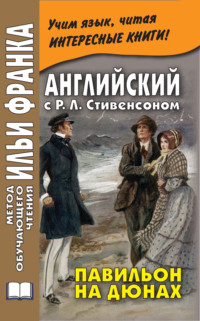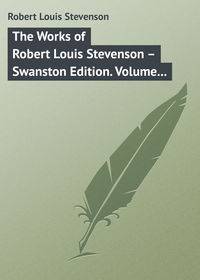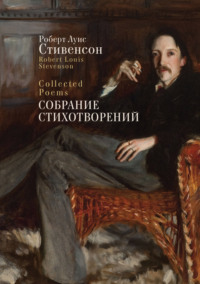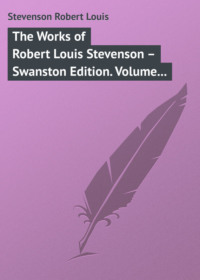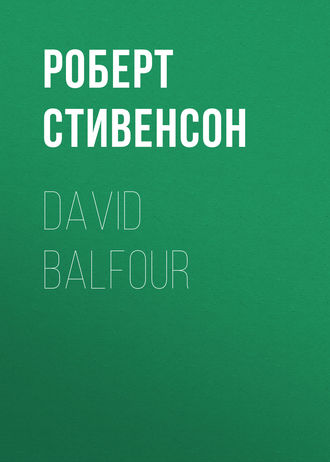 полная версия
полная версияDavid Balfour
"I am glad to see you are thrifty, Mr. Balfour," says he, making his notes.
"I would think shame to be otherwise the first day of my fortune," said I. "And now, if you will compute the outlay and your own proper charges, I would be glad to know if I could get some spending-money back. It's not that I grudge the whole of it to get Alan safe; it's not that I lack more; but having drawn so much the one day, I think it would have a very ill appearance if I was back again seeking, the next. Only be sure you have enough," I added, "for I am very undesirous to meet with you again."
"Well, and I'm pleased to see you're cautious too," said the Writer. "But I think ye take a risk to lay so considerable a sum at my discretion."
He said this with a plain sneer.
"I'll have to run the hazard," I replied. "O, and there's another service I would ask, and that's to direct me to a lodging, for I have no roof to my head. But it must be a lodging I may seem to have hit upon by accident, for it would never do if the Lord Advocate were to get any jealousy of our acquaintance."
"Ye may set your weary spirit at rest," said he. "I will never name your name, sir; and it's my belief the Advocate is still so much to be sympathised with that he doesnae ken of your existence."
I saw I had got to the wrong side of the man.
"There's a braw day coming for him, then," said I, "for he'll have to learn of it on the deaf side of his head no later than to-morrow, when I call on him."
"When ye call on him!" repeated Mr. Stewart. "Am I daft, or are you? What takes ye near the Advocate?"
"O, just to give myself up," said I.
"Mr. Balfour," he cried, "are ye making a mock of me?"
"No, sir," said I, "though I think you have allowed yourself some such freedom with myself. But I give you to understand once and for all that I am in no jesting spirit."
"Nor yet me," says Stewart. "And I give you to understand (if that's to be the word) that I like the looks of your behaviour less and less. You come here to me with all sorts of propositions, which will put me in a train of very doubtful acts and bring me among very undesirable persons this many a day to come. And then you tell me you're going straight out of my office to make your peace with the Advocate! Alan's button here or Alan's button there, the four quarters of Alan wouldnae bribe me further in."
"I would take it with a little more temper," said I, "and perhaps we can avoid what you object to. I can see no way for it but to give myself up, but perhaps you can see another; and if you could, I could never deny but what I would be rather relieved. For I think my traffic with his lordship is little likely to agree with my health. There's just the one thing clear, that I have to give my evidence; for I hope it'll save Alan's character (what's left of it), and James's neck, which is the more immediate."
He was silent for a breathing-space, and then, "My man," said he, "you'll never be allowed to give such evidence."
"We'll have to see about that," said I; "I'm stiff-necked when I like."
"Ye muckle ass!" cried Stewart, "it's James they want; James has got to hang-Alan too, if they could catch him-but James whatever! Go near the Advocate with any such business, and you'll see! he'll find a way to muzzle ye."
"I think better of the Advocate than that," said I.
"The Advocate be damned!" cries he. "It's the Campbells, man! You'll have the whole clanjamfry of them on your back; and so will the Advocate too, poor body! It's extraordinar ye cannot see where ye stand! If there's no fair way to stop your gab, there's a foul one gaping. They can put ye in the dock, do ye no see that?" he cried, and stabbed me with one finger in the leg.
"Ay," said I, "I was told that same no further back than this morning by another lawyer."
"And who was he?" asked Stewart. "He spoke sense at least."
I told I must be excused from naming him, for he was a decent stout old Whig, and had little mind to be mixed up in such affairs.
"I think all the world seems to be mixed up in it!" cries Stewart. "But what said you?"
I told him what had passed between Rankeillor and myself before the house of Shaws.
"Well, and so ye will hang!" said he. "Ye'll hang beside James Stewart. There's your fortune told."
"I hope better of it yet than that," said I; "but I could never deny there was a risk."
"Risk!" says he, and then sat silent again. "I ought to thank you for your staunchness to my friends, to whom you show a very good spirit," he says, "if you have the strength to stand by it. But I warn you that you're wading deep. I wouldn't put myself in your place (me that's a Stewart born!) for all the Stewarts that ever there were since Noah. Risk? ay, I take over-many, but to be tried in court before a Campbell jury and a Campbell judge, and that in a Campbell country and upon a Campbell quarrel-think what you like of me, Balfour, it's beyond me."
"It's a different way of thinking, I suppose," said I; "I was brought up to this one by my father before me."
"Glory to his bones! he has left a decent son to his name," says he. "Yet I would not have you judge me over-sorely. My case is dooms hard. See, sir! ye tell me ye're a Whig: I wonder what I am. No Whig to be sure; I couldnae be just that. But-laigh in your ear, man-I'm maybe no very keen on the other side."
"Is that a fact?" cried I. "It's what I would think of a man of your intelligence."
"Hut! none of your whillywhas!"4 cries he. "There's intelligence upon both sides. But for my private part I have no particular desire to harm King George; and as for King James, God bless him! he does very well for me across the water. I'm a lawyer, ye see: fond of my books and my bottle, a good plea, a well-drawn deed, a crack in the Parliament House with other lawyer bodies, and perhaps a turn at the golf on a Saturday at e'en. Where do ye come in with your Hieland plaids and claymores?"
"Well," said I, "it's a fact ye have little of the wild Highlandman."
"Little?" quoth he. "Nothing, man! And yet I'm Hieland born, and when the clan pipes, who but me has to dance? The clan and the name, that goes by all. It's just what you said yourself; my father learned it to me, and a bonny trade I have of it. Treason and traitors, and the smuggling of them out and in; and the French recruiting, weary fall it! and the smuggling through of the recruits; and their pleas-a sorrow of their pleas! Here haye I been moving one for young Ardshiel, my cousin; claimed the estate under the marriage contract-a forfeited estate! I told them it was nonsense: muckle they cared! And there was I cocking behind a yadvocate that liked the business as little as myself, for it was fair ruin to the pair of us-a black mark, disaffected, branded on our hurdies, like folk's names upon their kye! And what can I do? I'm a Stewart, ye see, and must fend for my clan and family. Then no later by than yesterday there was one of our Stewart lads carried to the Castle. What for? I ken fine: Act of 1736: recruiting for King Lewie. And you'll see, he'll whistle me in to be his lawyer, and there'll be another black mark on my chara'ter! I tell you fair: if I but kent the heid of a Hebrew word from the hurdies of it be dammed but I would fling the whole thing up and turn minister!"
"It's rather a hard position," said I.
"Dooms hard!" cries he. "And that's what makes me think so much of ye-you that's no Stewart-to stick your head so deep in Stewart business. And for what, I do not know; unless it was the sense of duty."
"I hope it will be that," said I.
"Well," says he, "it's a grand quality. But here is my clerk back; and, by your leave, we'll pick a bit of dinner, all the three of us. When that's done, I'll give you the direction of a very decent man, that'll be very fain to have you for a lodger. And I'll fill your pockets to ye, forbye, out of your ain bag. For this business'll not be near as dear as ye suppose-not even the ship part of it."
I made him a sign that his clerk was within hearing.
"Hoot, ye neednae mind for Robbie," cries he. "A Stewart too, puir deevil! and has smuggled out more French recruits and trafficking Papists than what he has hairs upon his face. Why, it's Robin that manages that branch of my affairs. Who will we have now, Rob, for across the water?"
"There'll be Andie Scougal, in the Thristle," replied Rob. "I saw Hoseason the other day, but it seems he's wanting the ship. Then there'll be Tarn Stobo; but I'm none so sure of Tam. I've seen him colloguing with some gey queer acquaintances; and if it was anybody important, I would give Tam the go-by."
"The head's worth two hundred pounds, Robin," said Stewart.
"Gosh, that'll no be Alan Breck?" cried the clerk.
"Just Alan," said his master.
"Weary winds! that's sayrious," cried Robin. "I'll try Andie then; Andie'll be the best."
"It seems it's quite a big business," I observed.
"Mr. Balfour, there's no end to it," said Stewart.
"There was a name your clerk mentioned," I went on: "Hoseason. That must be my man, I think: Hoseason, of the brig Covenant. Would you set your trust on him?"
"He didnae behave very well to you and Alan," said Mr. Stewart; "but my mind of the man in general is rather otherwise. If he had taken Alan on board his ship on an agreement, it's my notion he would have proved a just dealer. How say ye, Rob?"
"No more honest skipper in the trade than Eli," said the clerk. "I would lippen to5 Eli's word-ay, if it was the Chevalier, or Appin himsel'," he added.
"And it was him that brought the doctor, wasnae't?" asked the master.
"He was the very man," said the clerk.
"And I think he took the doctor back?" says Stewart.
"Ay, with his sporran full!" cried Robin. "And Eli kent of that!"6
"Well, it seems it's hard to ken folk rightly," said I.
"That was just what I forgot when ye came in, Mr. Balfour!" says the Writer.
CHAPTER III
I GO TO PILRIG
The next morning, I was no sooner awake in my new lodging than I was up and into my new clothes; and no sooner the breakfast swallowed, than I was forth on my adventures. Alan, I could hope, was fended for; James was like to be a more difficult affair, and I could not but think that enterprise might cost me dear, even as everybody said to whom I had opened my opinion. It seemed I was come to the top of the mountain only to cast myself down; that I had clambered up, through so many and hard trials, to be rich, to be recognised, to wear city clothes and a sword to my side, all to commit mere suicide at the last end of it, and the worst kind of suicide besides, which is to get hanged at the King's charges.
What was I doing it for? I asked, as I went down the High Street and out north by Leith Wynd. First I said it was to save James Stewart, and no doubt the memory of his distress, and his wife's cries, and a word or so I had let drop on that occasion worked upon me strongly. At the same time I reflected that it was (or ought to be) the most indifferent matter to my father's son, whether James died in his bed or from a scaffold. He was Alan's cousin, to be sure; but so far as regarded Alan, the best thing would be to lie low, and let the King, and his Grace of Argyll, and the corbie crows, pick the bones of his kinsman their own way. Nor could I forget that, while we were all in the pot together, James had shown no such particular anxiety whether for Alan or me.
Next it came upon me I was acting for the sake of justice: and I thought that a fine word, and reasoned it out that (since we dwelt in polities, at some discomfort to each one of us) the main thing of all must still be justice, and the death of any innocent man a wound upon the whole community. Next, again, it was the Accuser of the Brethren that gave me a turn of his argument; bid me think shame for pretending myself concerned in these high matters, and told me I was but a prating vain child, who had spoken big words to Rankeillor and to Stewart, and held myself bound upon my vanity to make good that boastfulness. Nay, and he hit me with the other end of the stick; for he accused me of a kind of artful cowardice, going about at the expense of a little risk to purchase greater safety. No doubt, until I had declared and cleared myself, I might any day encounter Mungo Campbell or the sheriff's officer, and be recognised, and dragged into the Appin murder by the heels; and, no doubt, in case I could manage my declaration with success, I should breathe more free for ever after. But when I looked this argument full in the face I could see nothing to be ashamed of. As for the rest, "Here are the two roads," I thought, "and both go to the same place. It's unjust that James should hang if I can save him; and it would be ridiculous in me to have talked so much and then do nothing. It's lucky for James of the Glens that I have boasted beforehand; and none so unlucky for myself, because now I'm committed to do right. I have the name of a gentleman and the means of one; it would be a poor discovery that I was wanting in the essence." And then I thought this was a Pagan spirit, and said a prayer in to myself, asking for what courage I might lack, and that I might go straight to my duty like a soldier to battle, and come off again scatheless as so many do.
This train of reasoning brought me to a more resolved complexion; though it was far from closing up my sense of the dangers that surrounded me, nor of how very apt I was (if I went on) to stumble on the ladder of the gallows. It was a plain, fair morning, but the wind in the east. The little chill of it sang in my blood, and gave me a feeling of the autumn, and the dead leaves, and dead folks' bodies in their graves. It seemed the devil was in it, if I was to die in that tide of my fortunes and for other folks' affairs. On the top of the Calton Hill, though it was not the customary time of year for that diversion, some children were crying and running with their kites. These toys appeared very plain against the sky; I remarked a great one soar on the wind to a high altitude and then plump among the whins; and I thought to myself at sight of it, "There goes Davie."
My way lay over Mouter's Hill, and through an end of a clachan on the braeside among fields. There was a whirr of looms in it went from house to house; bees bummed in the gardens; the neighbours that I saw at the doorsteps talked in a strange tongue; and I found out later that this was Picardy, a village where the French weavers wrought for the Linen Company. Here I got a fresh direction for Pilrig, my destination; and a little beyond, on the wayside, came by a gibbet and two men hanged in chains. They were dipped in tar, as the manner is; the wind span them, the chains clattered, and the birds hung about the uncanny jumping-jacks and cried. The sight coming on me suddenly, like an illustration of my fears, I could scarce be done with examining it and drinking in discomfort. And as I thus turned and turned about the gibbet, what should I strike on, but a weird old wife, that sat behind a leg of it, and nodded, and talked aloud to herself with becks and courtesies.
"Who are these two, mother?" I asked, and pointed to the corpses.
"A blessing on your precious face!" she cried. "Twa joes7 o' mine: just twa o' my old joes, my hinny dear."
"What did they suffer for?" I asked.
"Ou, just for the guid cause," said she. "Aften I spaed to them the way that it would end. Twa shillin' Scots; no pickle mair; and there are twa bonny callants hingin' for 't! They took it frae a wean8 belanged to Brouchton."
"Ay!" said I to myself, and not to the daft limmer, "and did they come to such a figure for so poor a business? This is to lose all indeed."
"Gie's your loof,9 hinny," says she, "and let me spae your weird to ye."
"No, mother," said I, "I see far enough the way I am. It's an unco thing to see too far in front."
"I read it in your bree," she said. "There's a bonnie lassie that has bricht een, and there's a wee man in a braw coat, and a big man in a pouthered wig, and there's the shadow of the wuddy,10 joe, that lies braid across your path. Gie's your loof, hinny, and let Auld Merren spae it to ye bonny."
The two chance shots that seemed to point at Alan and the daughter of James More, struck me hard; and I fled from the eldritch creature, casting her a baubee, which she continued to sit and play with under the moving shadows of the hanged.
My way down the causeway of Leith Walk would have been more pleasant to me but for this encounter. The old rampart ran among fields, the like of them I had never seen for artfulness of agriculture; I was pleased, besides, to be so far in the still countryside; but the shackles of the gibbet clattered in my head; and the mops and mows of the old witch, and the thought of the dead men, hag-rode my spirits. To hang on a gallows, that seemed a hard case; and whether a man came to hang there for two shillings Scots, or (as Mr. Stewart had it) from the sense of duty, once he was tarred and shackled and hung up, the difference seemed small. There might David Balfour hang, and other lads pass on their errands and think light of him; and old daft limmers sit at leg-foot and spae their fortunes; and the clean genty maids go by, and look to the other side, and hold a nose. I saw them plain, and they had grey eyes, and their screens upon their heads were of the Drummond colours.
I was thus in the poorest of spirits, though still pretty resolved, when I came in view of Pilrig, a pleasant gabled house set by the walkside among some brave young woods. The laird's horse was standing saddled at the door as I came up, but himself was in the study, where he received me in the midst of learned works and musical instruments, for he was not only a deep philosopher but much of a musician. He greeted me at first pretty well, and when he had read Rankeillor's letter, placed himself obligingly at my disposal.
"And what is it, cousin David?" says he-"since it appears that we are cousins-what is this that I can do for you? A word to Prestongrange? Doubtless that is easily given. But what should be the word?"
"Mr. Balfour," said I, "if I were to tell you my whole story the way it fell out, it's my opinion (and it was Rankeillor's before me) that you would be very little made up with it."
"I am sorry to hear this of you, kinsman," says he.
"I must not take that at your hands, Mr. Balfour," said I; "I have nothing to my charge to make me sorry, or you for me, but just the common infirmities of mankind. 'The guilt of Adam's first sin, the want of original righteousness, and the corruption of my whole nature,' so much I must answer for, and I hope I have been taught where to look for help," I said; for I judged from the look of the man he would think the better of me if I knew my questions.11 "But in the way of worldly honour I have no great stumble to reproach myself with; and my difficulties have befallen me very much against my will and (by all that I can see) without my fault. My trouble is to have become dipped in a political complication, which it is judged you would be blythe to avoid a knowledge of."
"Why, very well, Mr. David," he replied, "I am pleased to see you are all that Rankeillor represented. And for what you say of political complications, you do me no more than justice. It is my study to be beyond suspicion, and indeed outside the field of it. The question is," says he, "how, if I am to know nothing of the matter, I can very well assist you?"
"Why, sir," said I, "I propose you should write to his lordship, that I am a young man of reasonable good family and of good means: both of which I believe to be the case."
"I have Rankeillor's word for it," said Mr. Balfour, "and I count that a warrandice against all deadly."
"To which you might add (if you will take my word for so much) that I am a good churchman, loyal to King George, and so brought up," I went on.
"None of which will do you any harm," said Mr. Balfour.
"Then you might go on to say that I sought his lordship on a matter of great moment, connected with His Majesty's service and the administration of justice," I suggested.
"As I am not to hear the matter," says the laird, "I will not take upon myself to qualify its weight. 'Great moment' therefore falls, and 'moment' along with it. For the rest, I might express myself much as you propose."
"And then, sir," said I, and rubbed my neck a little with my thumb, "then I would be very desirous if you could slip in a word that might perhaps tell for my protection."
"Protection?" says he. "For your protection? Here is a phrase that somewhat dampens me. If the matter be so dangerous, I own I would be a little loath to move in it blindfold."
"I believe I could indicate in two words where the thing sticks," said I.
"Perhaps that would be the best," said he.
"Well, it's the Appin murder," said I.
He held up both the hands. "Sirs! sirs!" cried he.
I thought by the expression of his face and voice that I had lost my helper.
"Let me explain …" I began.
"I thank you kindly, I will hear no more of it," says he. "I decline in toto to hear more of it. For your name's sake and Rankeillor's, and perhaps a little for your own, I will do what I can to help you; but I will hear no more upon the facts. And it is my first clear duty to warn you. These are deep waters, Mr. David, and you are a young man. Be cautious and think twice."
"It is to be supposed I will have thought oftener than that, Mr. Balfour," said I, "and I will direct your attention again to Rankeillor's letter, where (I hope and believe) he has registered his approval of that which I design."
"Well, well," said he; and then again, "Well, well! I will do what I can for you." Therewith he took a pen and paper, sat awhile in thought, and began to write with much consideration. "I understand that Rankeillor approves of what you have in mind?" he asked presently.
"After some discussion, sir, he bade me to go forward in God's name," said I.
"That is the name to go in," said Mr. Balfour, and resumed his writing. Presently, he signed, re-read what he had written, and addressed me again. "Now here, Mr. David," said he, "is a letter of introduction, which I will seal without closing, and give into your hands open, as the form requires. But since I am acting in the dark, I will just read it to you, so that you may see if it will secure your end-
"PILRIG, August 26th, 1751.
"MY LORD, – This is to bring to your notice my namesake andcousin, David Balfour Esquire of Shaws, a young gentleman of unblemished descent and good estate. He has enjoyed besides the more valuable advantages of a godly training, and his political principles are all that your lordship can desire. I am not in Mr. Balfour's confidence, but I understand him to have a matter to declare, touching His Majesty's service and the administration of justice: purposes for which your lordship's zeal is known. I should add that the young gentleman's intention is known to and approved by some of his friends, who will watch with hopeful anxiety the event of his success or failure.'
"Whereupon," continued Mr. Balfour, "I have subscribed myself with the usual compliments. You observe I have said 'some of your friends;' I hope you can justify my plural?"
"Perfectly, sir; my purpose is known and approved by more than one," said I. "And your letter, which I take a pleasure to thank you for, is all I could have hoped."
"It was all I could squeeze out," said he; "and from what I know of the matter you design to meddle in, I can only pray God that it may prove sufficient."
CHAPTER IV
LORD ADVOCATE PRESTONGRANGE
My kinsman kept me to a meal, "for the honour of the roof," he said; and I believe I made the better speed on my return. I had no thought but to be done with the next stage, and have myself fully committed; to a person circumstanced as I was, the appearance of closing a door on hesitation and temptation was itself extremely tempting; and I was the more disappointed, when I came to Prestongrange's house, to be informed he was abroad. I believe it was true at the moment, and for some hours after; and then I have no doubt the Advocate came home again, and enjoyed himself in a neighbouring chamber among friends, while perhaps the very fact of my arrival was forgotten. I would have gone away a dozen times, only for this strong drawing to have done with my declaration out of hand and be able to lay me down to sleep with a free conscience. At first I read, for the little cabinet where I was left contained a variety of books. But I fear I read with little profit; and the weather falling cloudy, the dusk coming up earlier than usual, and my cabinet being lighted with but a loophole of a window, I was at last obliged to desist from this diversion (such as it was), and pass the rest of my time of waiting in a very burthensome vacuity. The sound of people talking in a naer chamber, the pleasant note of a harpsichord, and once the voice of a lady singing, bore me a kind of company.


